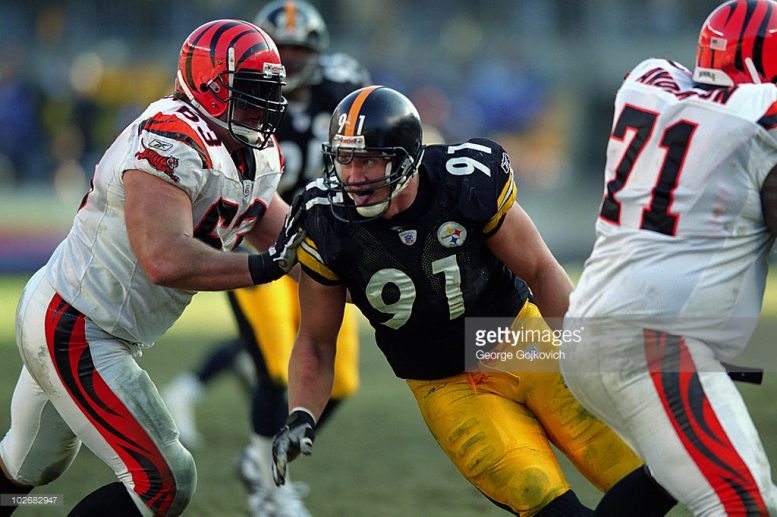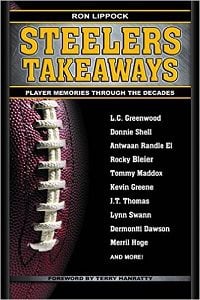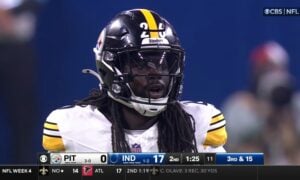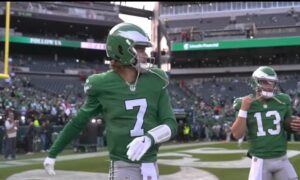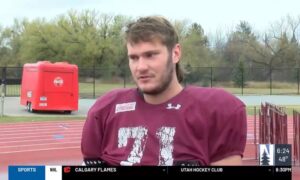Bringing you another Pittsburgh Steelers’ interview courtesy of our good friend Ron Lippock of the Pittsburgh Sports Daily Bulletin. Today, Ron chats with former Steelers’ defensive linemen Aaron Smith. Starting 152 games for Pittsburgh, he racked up 44 sacks and won two Super Bowls throughout his career. They talk about learning to play under John Mitchell and how Smith now realizes his Pittsburgh legacy.
Be sure to check out Ron’s book, Steelers’ Takeaways: Player Memories Through The Decades, featuring over 400 interviews with players and coaches, past and present. You can buy it on Amazon through the link provided here.
First, tell me about your new career s a coach – what made you decide to become a coach?
I enjoy it – sports has been such a large part of my life. It shaped who I am today. That’s why I wanted to do it. It’s been great. When I retired I helped the basketball coach at Eaton and then the football coach asked me to help them. It’s a dream come true to be able to coach both sports.
Basketball is interesting because you were a very good basketball player in high school. Why did you end up choosing football?
My first love was basketball. I didn’t play football until my freshman year in high school. I just realized that football was where my future lied.
Who really helped shape you now as a coach and were – was most influential to you?
My most influential coach was actually my high school basketball coach. Coach Beronik – I still talk to him and took him to the Super Bowl. He treated me like a person , not just for what I could do for him. Some coaches only care about the good players but I knew he cared about me as a person. He would talk to me about being competitive and strong but still being a good person. You can’t hustle kids. They know if you care – they can read that. Kids need boundaries. They need to be pushed and challenged, and as a coach you need to treat them all the same as you can. The same level of accountability. They thrive on it and it’s about the greater good of the group.
Everyone wants a college athlete as a high school coach. But in reality, why do we have high school sports? It’s not about scholarships and getting money to get kids in college – otherwise every school would lose money. So what is the purpose then? It’s about giving kids life skills. About sacrificing, hard work and discipline. Not for scholarships though some coaches focus on that. You might get a college athlete but they all are kids who need discipline.
Tell me about your experience moving on to college and getting drafted – were you surprised at getting drafted by the Steelers?
My Junior year a bunch of guys were getting looked at by college scouts. They were looking at a bunch of us and that’s when I first knew there was some interest. My agent started talking to me – that teams were interested. That’s when I realized the NFL was a potential reality. It hit me that is was a possibility. My last year the scouts started talking to you more. It became more of a reality.
It was a dream but you could never know if it was real. I was surprised the Steelers drafted me. But looking back on it they were at every workout. I had three interviews with them including Cowher at the combine. But my agent never mentioned Pittsburgh as having interest.
So once you’re in Pittsburgh, who helped mentor you as an NFL player – on and off the field?
My rookie year it was probably Joel Steed. But he was so quiet. He didn’t say a lot. The next season Kimo Von Oelhoffen was signed from Cincinnati and he taught me a lot about technique and just being a good guy. We had a good relationship and still talk today.
Many of the players I have spoken to that played with you on the defense spoke about your leadership and mentorship. Tell me what made you such a good mentor to the younger guys?
It wasn’t something I did consciously. I guess it was a couple of things. I treated everyone the same no matter where you were from. With dignity and respect. I mean, I know some players may not want to help guys that they thought might want to replace them.
But if you are that insecure though then you probably don’t deserve the job. That’s my own feelings. To me, if you, if you could beat me and take my job then you deserve it and that’s my own fault. If I can make you better it makes the team better. If I’m tired I need to come out I want someone there who can help us win. Dick LeBeau taught me it was my responsibility to help the younger guys, To reduce their mistakes and make it easier for them. You have to be strong and confident as a player to feel that way I guess.
Tell me about Coach Mitchell’s impact on you. So many guys spoke about how tough he was and how he helped shape them as well?
It’s funny. As a rookie I hated Mitch. I couldn’t stand him. I thought he despised me and I despised him. Then the next year the Steelers drafted another defensive lineman and I saw how hard he was on him. I realized then it wasn’t about me. I know now he’s a wonderful man. As a rookie you don’t know or see him for who he is. He sees in you what you don’t see in yourself. You think he’s just picking on you. But as a rookie you don’t know what you don’t know.
We laugh about it now. I thought he hated me and I hated him. But now, there’s no greater person. He’s tough and old school – and that’s why I like him and find myself coaching just like him. I find myself saying the same things, trying to be like him.
How hard and frustrating was that adjustment to a 3-4 defense for you?
It was a huge adjustment. I was an end in the 4-3 – my job was to run upfield and I sacked quarterbacks a ton. When I got to Pittsburgh they said here, line up at right end, play the two-gap, take on double-teams and hold the point, I thought – are you insane? I was out of my mind. I struggled with it. The techniques and footwork…it was all very much different. I really struggled. Mitch was killing me every day about my mistakes.
Then one day Orpheus Roye got hurt and he moved me to the other side for that practice. I had to put my right hand down for the first time and Mitch said I had the best practice I ever had, and they wouldn’t move me back to the other side again. It was just that one practice that did it. I didn’t have to unlearn anything – putting my right hand down was new. I had to start from scratch and that was easier than unlearning things. As a defensive lineman, so much is about habit. And those are hard to break,
How aware were you then of the cult legend you became to fans after you established yourself in Pittsburgh?
Ha! I do realize it more now. I run into people now that tell me that stuff. But then, I never read the papers – it was a conscious choice. It’s more apparent now but it makes me feel uncomfortable. I joke now that I became a better player now that I retired. Now, it hits me, But then, I was so focused it just didn’t.
So, give us a good story about your time in Pittsburgh?
I have a great one about Joey Porter. Joey was always a big talker but I wasn’t a huge talker. We were playing Baltimore and we were killing them. I was across from Orlando Brown – and he was big on intimidation. The visor, the way he looked at you like he was crazy and threw his arms around. Well I was kicking Orlando’s butt but again, I wasn’t one to talk trash. That wasn’t my thing.
But Joey started yelling at Orlando and talking trash to him, telling him “Smith is kicking your butt!” I kept telling Joey to shut up – that he didn’t have to line up across from him.. He didn’t even have to line up on the same side! We played so many games then too. The offense and defense would switch sides and see who could get to the football first. We played dodgeball with the physio balls. We had this game where we dunk on each other by hanging on the lockers…. Athletes are blessed. As adults we get to act like kids. We can be thirty-year olds but still play stupid games. It can be good and bad I guess.
Lastly – any advice for kids entering the NFL today?
There’s a quote by Kobe Bryant: “The ones who have true success are the talented guys who never believed they were talented.” That stuck with me. Too many talented athletes believe they are talented and don’t work hard enough. Those that make it never believe they were that talented and felt they had to work harder to make it. That’s the difference. The hunger and desire to succeed – to be greater than anyone else.
I think that’s why so few make it. I saw a Navy Seal speak and he talked about how they would rather die than fail. I think professional athletes are wired differently and feel similarly. Not that far maybe, but we are very similar to that.

